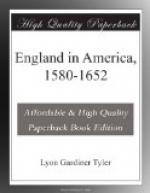In March, 1635, Captain Israel Stoughton, one of the deputies from Dorchester to the general court, incurred the resentment of the authorities. This “troubler of Israel,” as Governor Winthrop termed him, wrote a pamphlet denying the right of the governor and assistants to call themselves “Scriptural Magistrates.” Being questioned by the court, the captain made haste, according to the record, to desire that “the said book might be burned as being weak and oppressive.” Still unsatisfied, the court ordered that for his said offence he should for three years be disabled from bearing any office in the colony.[1]
The first great check which this religious despotism received proceeded from Roger Williams, who arrived in February, 1631, in the Lyon, which brought supplies to the famishing colonists of Massachusetts. He was the son of a merchant in London and a graduate of Pembroke College, Cambridge, where he took the degree of master of arts in 1627. In his mere religious creed Williams was harsher than even the orthodox ministers of Massachusetts. Soon after his arrival he was invited to become one of the ministers of the Boston church, but refused because that church declined to make a public declaration of their repentance for holding communion in the churches of England while they lived in the home country.
He was then invited to Salem, where he made himself very popular by his talents and eloquence. Nevertheless, within two months he advanced other “scrupulosities,” denying the validity of land-titles proceeding from the Massachusetts government, and the right of the magistrates to impose penalties as to Sabbath-breaking or breaches of the laws of the first table. Winthrop and his assistants complained to the Salem church, and this interference prevented his intended ordination at Salem.[2]
Williams presently removed to Plymouth, where his peculiar views were indulged, and where he improved his time in learning the Indian language and cultivating the acquaintance of the chief sachems of the neighboring Indian tribes. When, two years later, in 1633, Williams returned to live at Salem for the purpose of assisting the minister, Mr. Skelton, who was sick, the rulers of the church at Plymouth granted him a dismissal, but accompanied it with some words of warning about his “unsettled judgment and inconsistency."[3]
Williams was soon in trouble in Massachusetts. While at Plymouth his interest in the Indians led him to prepare for the private reading of Bradford a pamphlet which argued that the king of England had no right to give away the lands of the Indians in America. The pamphlet had never been published, but reports of its contents reached Boston, and the court of assistants, following, as usual, the advice of the ministers, pounced upon the author and summoned him to answer for what it was claimed was a denial of their charter rights.




